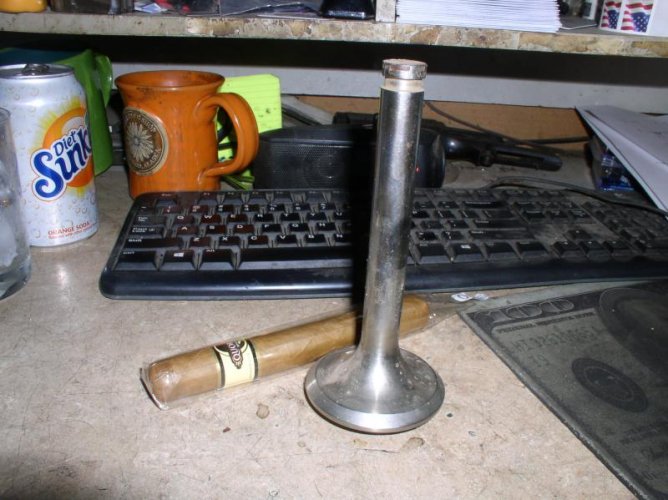wallymortar
New member
I have a 1975 R90/6 with about 35,000 original miles. Recently, I lost compression (about 1/2) in the right cylinder and it started burning oil. The left cylinder is within compression spec and no problems. When I took compression readings on the right cylinder after adding some oil, the compression momentarily increased to within spec. I concluded that meant worn or broken piston ring(s). I tore both cylinders down, expecting to find a broken ring or worse and everything looks okay, albeit the pistons are pretty carboned up and the valves are pretty dirty but nothing atrocious. Cylinder walls appear smooth with no scoring. I mic'd the offending cylinder and it averages 89.97mm (6 readings; 3 90 deg apart). The piston skirt averages 89.75mm, yielding a 0.05mm piston to bore clearance. If I'm reading the specs correctly, that's about 0.005mm over spec. Other than possibly worn valve guides if I misinterpreted my compression test, is the data I captured enough to cause oil burning that seemed to develop over night? My inclination is to buy matched cylinders, pistons and rings and not try to hone the old cylinders and get rings to fit. Is that the way to go and, if so, can anyone give me a source for new jugs, pistons and matching rings?
Rev1: After Kurt's reply, I rechecked my cylinder bore measurements. I had used a Harbor Freight digital caliper to measure my bore gauge and had trouble with that caliper giving variable readings a while back while rebuilding a VW Rabbit diesel engine. This time I measured more carefully and used a mechanical dial caliper for my readings. Interestingly, the right (problem) cylinder checked out to Kurt's and Clymer's specs. The average of 6 measurements top, bottom & middle of the cylinder and again 90 degrees from the other 3 measured an average of 90.009, within 0.001mm of the Grade B cylinder bore spec. The right piston crown was not marked A, B or C per Clymer's but was stamped 89.986, 0.006mm above the Grade C spec listed in Clymer's. I'm not sure what the number stamped on the piston crown means because the piston skirt measures an average of 89.878. I then measured the left cylinder - the cylinder that had compression in spec and was not giving me any problem - and I was surprised that the average bore diameter using the same measuring tools was 89.986, 0.014mm below the Grade A spec and the left piston was also stamped 89.986 but the skirt averaged 89.776. Anyway, these measurements are more accurate and I still don't know whether to buy standard rings or not and have yet to perform the valve leak test suggested by "copbike."
Rev1: After Kurt's reply, I rechecked my cylinder bore measurements. I had used a Harbor Freight digital caliper to measure my bore gauge and had trouble with that caliper giving variable readings a while back while rebuilding a VW Rabbit diesel engine. This time I measured more carefully and used a mechanical dial caliper for my readings. Interestingly, the right (problem) cylinder checked out to Kurt's and Clymer's specs. The average of 6 measurements top, bottom & middle of the cylinder and again 90 degrees from the other 3 measured an average of 90.009, within 0.001mm of the Grade B cylinder bore spec. The right piston crown was not marked A, B or C per Clymer's but was stamped 89.986, 0.006mm above the Grade C spec listed in Clymer's. I'm not sure what the number stamped on the piston crown means because the piston skirt measures an average of 89.878. I then measured the left cylinder - the cylinder that had compression in spec and was not giving me any problem - and I was surprised that the average bore diameter using the same measuring tools was 89.986, 0.014mm below the Grade A spec and the left piston was also stamped 89.986 but the skirt averaged 89.776. Anyway, these measurements are more accurate and I still don't know whether to buy standard rings or not and have yet to perform the valve leak test suggested by "copbike."
Last edited:

